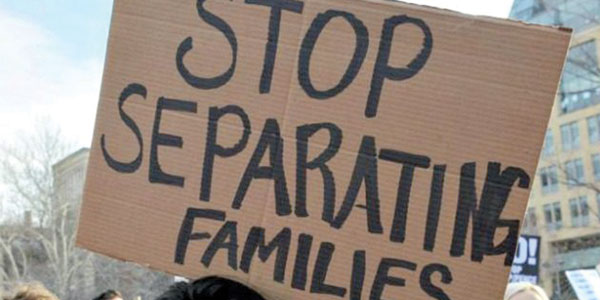
By Emanuel Cleaver II
As a member of the United States House of Representatives, I have always attempted to refrain from the use of biblical scriptures. However, with the attorney general’s questionable use of scripture to rescind asylum protection for immigrant victims of domestic and gang related violence, I would like to shed some light on some of my Christological views of life. Leviticus 19:34 of the Hebrew Testament states that, “but the stranger that dwelleth with you shall be unto you as one born among you, and thou shalt love him as thyself; for ye were strangers in the land of Egypt”.
This passage of the Bible is one of the many that demands our love for the strangers amongst us. Moreover, the passage is particularly relevant to Americans and the present day political landscape, as a reminder that most of us are the descendants of immigrants. Our ancestors were once strangers in this land, and now the Lord charges us to love the strangers of today and to welcome them as if they were born among us.
As a flawed but committed Christian and an Elder in the United Methodist Church, I long ago developed a theology of humane and compassionate immigration policies. It pains me to witness the decline that our nation is condoning in this day and age. Although we live in an era of innovation and technological advancements that could not have been imagined by the creators of the 1960’s hit television franchise Star Trek, the current administration has reversed any progress our nation has made with immigration. The Trump administration’s “zero tolerance” policy forced many marginalized individuals within our great nation to face the sudden and cruel realities of deportation. Moreover, with the attorney general’s previous enforcement of the grossly unfair and morally wrong “family separation” policy, it is clear that a tidal wave of political consequences will be felt throughout the world.
Victims of spousal abuse may now remain quiet, fearful of the denial that awaits at the border. Families desperately seeking refuge are turned away, based solely on the fact that the persecution and violence from which they are fleeing is gang related. Unfortunately, the current administration now groups together both the victim and perpetrator into one common identity. Infants are ripped from their mother’s arms, children are crying out for their parents as they are forcefully separated, and mass amounts of young boys and girls are being detained in cages like animals and held in tent cities. All of this is happening with no plan for reunification, intent of humane refuge, or justice. The appalling and unsparing actions force me to beg the question: where is our humanity?
Furthermore, the executive branch boasts orders such as the infamously known “Muslim ban”. Where do we draw the line between an imperative policy and an inhumane punishment? It is essential to protect our nation from the rising issue of terrorism and other external threats; however, we cannot do this without protecting the values of democracy with which the country was first founded upon. As we navigate through this tumultuous time, let us not forget the righteous message bestowed upon us, “owe no one anything, except to love one another; for the one who loves another has fulfilled the law,” Romans 13:8. It is possible to protect our nation, without harming immigrants. We can open our hearts without closing our borders. We must remind others that civility does not necessitate citizenship.
As a nation, we have lost our sense of direction. Our moral compass is off. As terms like compassion, empathy, tolerance, and understanding become paralyzing diction in the world of polarizing politics, we stray farther from the path that consequently leads us to becoming better. Nevertheless, we are not yet what we should become, and we will never be better off without being better- to ourselves, to our neighbors, and to the strangers of today. I urge victims fearful of what their future holds to remain hopeful. Despite the trying times our nation is faced with, I still have faith that we will soar.
A Christological view is a personalized perspective of life through the central figure of my faith. My view of life is that I must embrace compassion over conjecture and benevolence over belligerence. Therefore, to those seeking asylum, America must stand with you. To those fearful of existing in this country because of the status of their citizenship, America must stand up for you. To those advocating on behalf of these marginalized voices, America must stand by you. What we can become when we act out of compassion with civility and humanity is limitless. As the Representative of the Fifth District of Missouri, I live in the conventionally known “show me state”. So show me compassion. Show me civility. Show them humanity.
Inmigración: lo que fue un faro de esperanza, ahora es una luz que disminuye
Como miembro de la Cámara de Representantes de los Estados Unidos, siempre he intentado abstenerme del uso de las citas de escrituras bíblicas. Sin embargo, con el cuestionable uso de las escrituras por parte del fiscal general para rescindir la protección de asilo para las víctimas inmigrantes de violencia doméstica y relacionada con pandillas, me gustaría arrojar algo de luz sobre algunos de mis puntos de vista cristológicos sobre la vida. El Levítico 19:34 del Testamento Hebreo indica que, “el extranjero que vive contigo será para ti como uno nacido entre vosotros y lo amarás como a ti mismo, porque extranjeros fuisteis en la tierra de Egipto “.
Este pasaje de la Biblia es uno de los muchos que demanda nuestro amor por los extranjeros entre nosotros. Además, el pasaje es particularmente relevante para los estadounidenses y el panorama político actual, como un recordatorio de que la mayoría de nosotros somos descendientes de inmigrantes. Nuestros antepasados fueron una vez extranjeros en esta tierra, y ahora el Señor nos acusa de amar a los extranjeros de hoy y de darles la bienvenida como si hubieran nacido entre nosotros.
Como un cristiano comprometido pero con fallas y un mayor en la United Methodist Church, hace mucho tiempo desarrollé una teología de políticas de inmigración humanitarias y compasivas. Me duele presenciar el declive que nuestra nación está tolerando en este día y año. Aunque vivimos en una era de innovación y avances tecnológicos que no podrían haber sido imaginados por los creadores de la exitosa franquicia de televisión de los años 60, Star Trek, el gobierno actual ha revertido cualquier progreso que nuestra nación haya hecho con la inmigración. La política de “cero tolerancia” del gobierno de Trump forzó a muchas personas marginadas dentro de nuestra gran nación a enfrentar las realidades repentinas y crueles de la deportación. Además, con la aplicación previa por parte del fiscal general de la política de “separación familiar” groseramente injusta y moralmente errónea, está claro que se experimentará una avalancha de consecuencias políticas en todo el mundo.
Las víctimas de abuso conyugal ahora pueden permanecer calladas, temerosas de la negación que espera en la frontera. Las familias que buscan desesperadamente refugio son rechazadas, basándose únicamente en el hecho de que la persecución y la violencia de la que huyen están relacionadas con las pandillas. Desafortunadamente, el gobierno actual ahora agrupa a la víctima y al perpetrador en una identidad común. Los bebés son arrancados de los brazos de su madre, los niños claman por sus padres mientras son separados por la fuerza, y cantidades masivas de niños y niñas son detenidos en jaulas como animales y recluidos en tiendas de campaña. Todo esto está sucediendo sin un plan para la reunificación, un intento de refugio humano o justicia. Las acciones espantosas y despiadadas me obligan a mendigar la pregunta: ¿dónde está nuestra humanidad?
Además, la rama ejecutiva cuenta con órdenes como la infamemente conocida “prohibición musulmana”. ¿Dónde trazamos la línea entre una política imperativa y un castigo inhumano? Es esencial proteger a nuestra nación del creciente problema del terrorismo y otras amenazas externas; sin embargo, no podemos hacer esto sin proteger los valores de la democracia con los que se fundó el país. A medida que naveguemos a través de este tiempo tumultuoso, no olvidemos el mensaje justo que se nos ha otorgado, “no le debemos a nadie nada, excepto amarnos unos a otros; porque el que ama al prójimo ha cumplido la ley “, Romanos 13: 8. Es posible proteger a nuestra nación, sin dañar a los inmigrantes. Podemos abrir nuestros corazones sin cerrar nuestras fronteras. Debemos recordar a los demás que la cortesía no requiere ciudadanía.
Como nación, hemos perdido nuestro sentido de la orientación. Nuestra brújula moral está apagada. A medida que términos como compasión, empatía, tolerancia y comprensión se convierten en una dicción paralizante en el mundo polarizador de la política, nos alejamos más del camino que nos lleva a ser mejores. Sin embargo, aún no somos lo que deberíamos ser y nunca mejoraremos sin ser mejores para nosotros mismos, nuestros vecinos y los extraños de hoy. Pido a las víctimas temerosas de lo que les depara el futuro a mantenerse esperanzadas. A pesar de los tiempos difíciles a los que se enfrenta nuestra nación, todavía tengo fe en que nos elevaremos.
Una visión cristológica es una perspectiva personalizada de la vida a través de la figura central de mi fe. Mi visión de la vida es que debo abrazar la compasión sobre la conjetura y la benevolencia sobre la beligerancia. Por lo tanto, para aquellos que buscan asilo, Estados Unidos debe estar con ustedes. Para aquellos temerosos de existir en este país debido al estado de su ciudadanía, Estados Unidos debe defenderlos. Para aquellos que abogan en nombre de estas voces marginadas, Estados Unidos debe respaldarlos. En lo que podemos llegar a ser cuando actuamos por compasión con civilidad y humanidad no tiene límites. Como Representante del Quinto Distrito de Missouri, vivo en la conocida condición de “muéstrame”. Por lo que muéstrame compasión. Muéstrame cortesía. Muéstrales humanidad.










